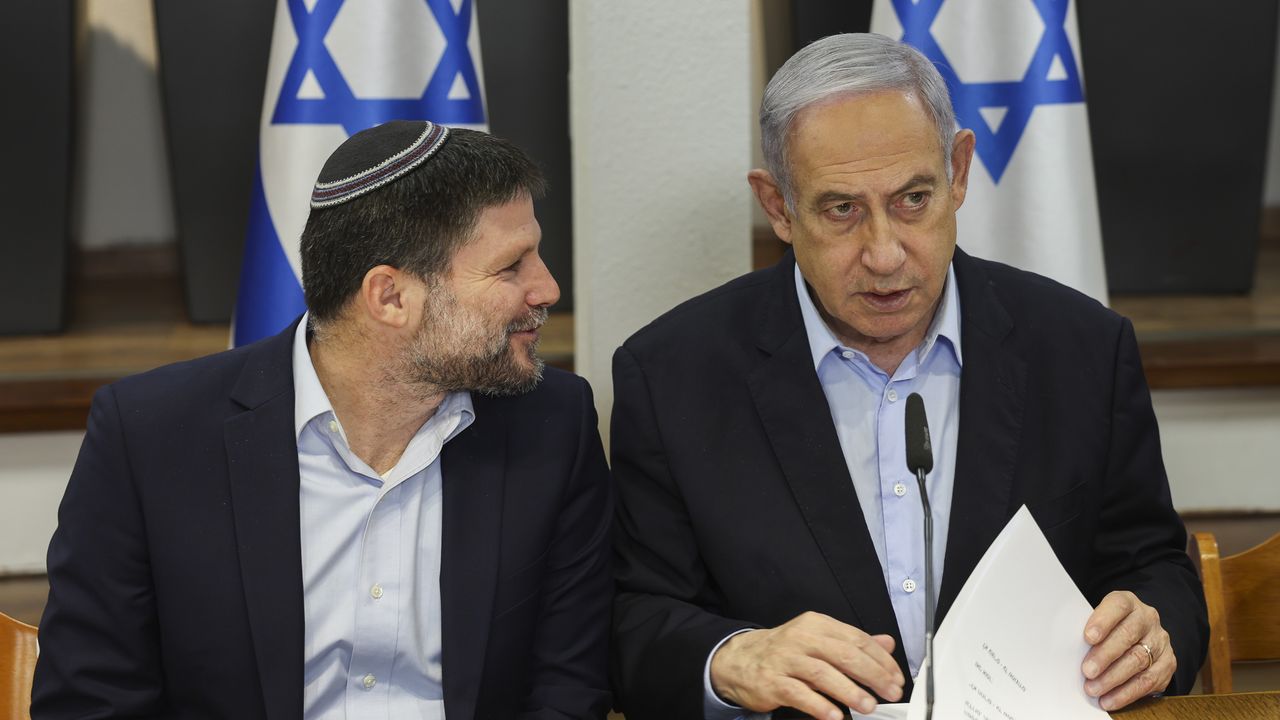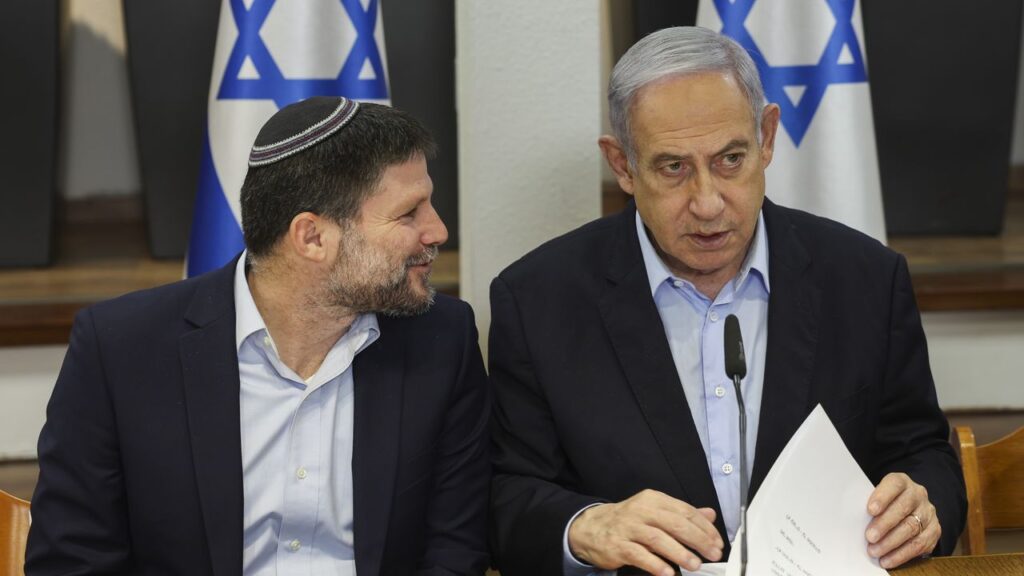
Prime Minister Benjamin Netanyahu’s government is accelerating efforts to establish an authoritarian state in parallel with its war to annihilate the Palestinians in Gaza.
Unable to achieve its twin aims of implementing Jewish Supremacy throughout “Greater Israel” and preventing any possibility of a Palestinian statelet alongside Israel within Israel through democratic means, the Zionist state must suppress its own citizens, including Jews.
The Knesset (parliament) defied mass opposition to the government’s “judicial overhaul” and passed a key component of the legislative agenda last year aimed at limiting the High Court’s power to override legislation that conflicted with Israel’s Basic Law, the nearest the Zionist state has to a constitution. But this was later struck down by the High Court.
Undeterred, Justice Minister Yariv Lewin has refused to bring the appointment of a new Supreme Court president and two new Supreme Court justices to replace several retirees for approval at the Judicial Selection Committee, where the government does not have a majority to push through its appointees. This work-around ensures it now has the necessary right-wing majority in the High Court to pursue its dictatorial agenda.
The government has introduced a raft of new anti-democratic laws, increasing surveillance over the Palestinians and of Israeli citizens and restricting freedom of speech.
New laws give the Israel Defense Forces (IDF) and Shin Bet, Israel’s domestic spy agency that reports to the Prime Minister’s Office, greater powers to hack into the private computer systems used to operate CCTV cameras and to erase, alter or disrupt materials on them, without either the knowledge of the computer’s owner or permission from a court. This is supposedly allowed in cases that might jeopardize “state security or the continuity of the operational functioning of the IDF with respect to military operations carried out as part of the war,” when it’s urgently necessary, and when it’s impossible to obtain access “another way that infringes rights to a lesser degree.”
The government has tabled another bill to allow the Shin Bet to search computers and cell phones without the owners’ knowledge. This would enable Israel’s spies—with authorisation from the prime minister and a legal opinion from the attorney general—to gain access to the databases of public authorities, including government ministries, the police, and the National Insurance Institute and use Pegasus-type spyware to search computers and phones holding private correspondence.
With journalists also included within the Shin Bet’s reach, the government is seeking to clamp down further on press freedom. Communications Minister Shlomo Karhi is trying to take control of the Israeli media, including the Kan public broadcaster. Two months ago, the government closed Al Jazeera’s operations in Israel/Palestine, branding it “Hamas’s mouthpiece” and a “threat to Israel’s national security” and accusing it of inciting against Israeli soldiers. It confiscated Al-Jazeera’s broadcasting equipment and blocked its websites. The network had reported Israel’s genocidal war on Gaza extensively, maintaining 24-hour coverage in the Gaza Strip even as Israel’s criminal campaign killed and wounded members of its staff.
The Jewish Power Minister of National Security Itamar Ben-Gvir has sought to mobilise vigilante gangs to hound the Palestinians and drive them out of their homes and off of their land in the West Bank and East Jerusalem. He has distributed about 30,000 automatic rifles to anyone classified as members of “community security guards,” not just in border towns and villages but cities throughout the country, and approved applications to thousands of people with no authority or training. It is now a common sight to see people in city centres walking around with a weapon slung over their shoulder. Ben-Gvir has sought to relax the regulations on opening fire.
He has sought to rein in the anti-government protests demanding a hostage deal and ceasefire, demanding the police stop the demonstrations, often violently using tear gas and water cannon. The clampdown on demonstrations has chiefly targeted Israel’s Palestinian citizens, with Police Commissioner Kobi Shabtai declaring, “Anyone who want to identify with Gaza is invited to take a bus there.”
The police have repeatedly prevented demonstrations in Arab towns, citing laws on incitement and the disruption of public order, with the Supreme Court declaring unanimously against a petition opposing the ban on demonstrations in Sakhnin and Umm al-Fahm. They have arrested hundreds of Israeli Palestinians for expressing solidarity with Palestinians in Gaza, opposing the war or taking part in peaceful protests. Authorities detained four former lawmakers planning a demonstration in Nazareth, including Higher Arab Monitoring Committee Chairman Mohammed Barakeh.
In addition, the authorities are clamping down on freedom of speech, monitoring almost all comments on social media for “incitement to terrorism.” Under the Justice Ministry’s hardline internet incitement policy, the police have filed more than 130 indictments, most against Israeli Palestinians, since October 7, compared to just 88 such indictments in the four years between 2018 and 2022. There is no longer any requirement to seek approval from the State Attorney’s Office to investigate suspected incitement, with proceedings against anyone suspected of posting comments supporting terrorism to be expedited, even for a first offence.
Legislation amending the “Fighting Terrorism Law” expands the range of activities deemed to be supporting or inciting terrorism and makes it a criminal offence, punishable by one year in prison, to repeatedly access content produced by Hamas or ISIS. The universities have rushed to initiate disciplinary proceedings against students who have praised Hamas or opposed the war. Soon after the war started, 30 universities and colleges opened 120 proceedings against students, mostly based on reporting of comments by fellow students with little or no regard for the actual content or context of the postings or remarks.
Israel’s treatment of the Palestinians inside the Sde Teiman detention centre in the Negev desert and other Israeli prisons bears comparison with the notorious US naval base in Guantanamo Bay, Cuba and Abu Ghraib prison in Iraq. A shocking CNN report last May revealed that Gazans imprisoned there—held without charge or legal representation on “national security grounds”—are blindfolded, forced into stress positions, beaten, insulted, and prevented from speaking for extended periods. Prisoners have had to have their limbs amputated due to their injuries.
The prisons are so full of Gazan detainees that Israel released the Shifa hospital director after six months, along with 50 others due to lack of space and the Supreme Court’s order to close the Sde Teiman detention centre.
The UN Independent International Commission of Inquiry’s report into Israeli prisons cited numerous examples of Israeli forces publicly stripping Palestinian women of their clothes and veils and subjecting them to sexual harassment in front of their families during ground operations in Gaza, as well as male victims being subject to sexual violence and humiliation in Gaza and the West Bank. It concluded that such was the frequency and severity of sexual and gender-based violations that they were likely “part of [Israeli security forces] operating procedures.”
In the West Bank, Israel’s Finance Minister and Religious Zionist Bezalel Smotrich has legalised five settler outposts established illegally under Israeli law and approved the construction of a record 12,855 housing units in the settlements since January. He has imposed restrictions on the movement of senior Palestinian Authority (PA) officials and authorised Israeli enforcement against “illicit” Palestinian construction in Area B, which is under the joint administration of the PA and Israeli military, violating the Oslo Accords. All the while, the army stands guard protecting far right settlers as they terrorise the Palestinians.
Smotrich is seeking the collapse of the PA, transferring only a small proportion of the hundreds of millions of dollars in tax revenues Israel collects on behalf of the PA. He has sought, unsuccessfully thus far, to withhold the waiver—in place since 2016 that shields Israeli banks from lawsuits for supporting terrorism—for Palestinian banks that allows Israeli banks to transact with them. The waiver is crucial for the PA’s imports of essential goods, payment of its essential services and salaries and all banking activity. Without it, the PA and the West Bank economy face a financial collapse that could destabilise the West Bank and the wider region.
